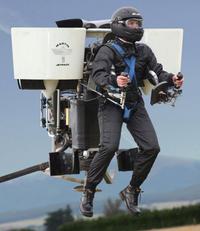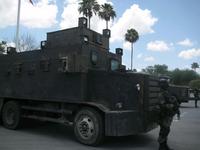-
Three arrested in PlayStation cyberattacks

On Friday, Spanish law enforcement officials arrested three men suspected of hacking into Sony’s PlayStation Network in addition to other major government and corporate websites around the world; the three men are suspected of being the local leaders of a secretive group of international hackers that call themselves Anonymous; the group has claimed responsibility for several high profile attacks on major sites like YouTube, Amazon, the Australian Parliament’s House website, and PayPal
-
-
DHS reduces monitoring of non-Islamic domestic terrorism

In May 2009, DHS issues a report saying that the recession and Obama’s election could lead to a “violent radicalization” of extremist groups in the United States; conservative politicians and commentators charged that the report was an attack on conservative ideology and groups opposing abortion and immigration; in response, DHS has eviscerated the analytical unit which issued the report, cut the number of personnel studying domestic terrorism unrelated to Islam, canceled state and local law enforcement briefings, held up dissemination of nearly a dozen reports on extremist groups, and has blocked the dissemination of a digest of domestic terror incidents and the distribution of definitions for terms such as “white supremacist” and “Christian Identity”; state and local law enforcement and security experts are worried
-
-
Emergency responders could have jetpacks by year's end

Emergency responders in New Zealand could soon be zipping around on personal jetpack; last month, Glenn Martin, an inventor based in New Zealand, successfully flew his jetpack up to a height of nearly 5,000 feet; Martin has been hard at work on the jetpack for the last thirty years and hopes to have his “jetski for the skies” commercially available within eighteen months; the jetpack is essentially two two-liter V4 engines strapped to a carbon fiber frame; the device is wingless and is controlled by two joysticks and can be flown with little pilot training; Martin says that the first people to use the device will be emergency responders conducting search and rescue missions
-
-
Sheriffs in Pasco County, Florida to stop crimes before they happen

Local law enforcement officials in Florida are taking a new more proactive approach to fighting crime; last week Pasco County Sheriff Chris Nocco announced that the department would begin implementing what he calls “intelligence-led policing”; under his plan, officers will focus on gathering intelligence and sharing that information with local, state, and federal agencies to stop crimes before they occur; according to Sheriff Nocco 6 percent of offenders commit 60 percent of crimes, and so his department will begin more closely monitoring these individuals; Nocco has requested additional staff to help map crime patterns and share intelligence; critics of the approach are concerned about the notion that police officers are closely monitoring people who have not committed any crimes
-
-
A machine that predicts crime
The very effort by individuals who are intent on committing a crime to mask their intent has detectable physiological manifestations; it should thus be possible to build a sensor which would identify these manifestations and correlate them with the underlying malintent
-
-
Anytime, anywhere communications across all devices enhances collaboration

Connecticut-based company offers anytime, anywhere communications across all types of devices — allowing public safety, emergency response, and select critical infrastructure entities to communicate and collaborate in the event of an emergency; the system may also be used by the military — in the field thousands of miles away — to alert, and provide information to in real time, domestic emergency agencies
-
-
Mexican drug cartels build "narco tanks"

In the latest development in Mexico’s bloody drug trade, it seems that rival cartels are building large armored vehicles in their fight against one another; over the weekend, the Mexican Army found two “Mad Max” style “narco tanks” in Ciudad Camargo in the state of Tamaulipas near the Texas border; the two vehicles had inch-thick steel armor and were built on a three-axle truck bed with a heavily armored cabin; the vehicles were capable of withstanding fire from 50 caliber mounted weapons and grenade blasts; so far none of the tanks have been used to confront the Mexican Army and officials believe that they are primarily used in inter-gang warfare
-
-
Middlesex County, N.J. gets $1 million for mobile tent system
Local emergency responders in New Jersey recently received a big boost in disaster preparedness from DHS; last week the county unveiled a new 3,000 square foot mobile structure comprised of interlocking tents and trailers; the tents can be quickly set up to treat victims of a radiological accident, terrorist attack, pandemic, or weather emergency; the tent system can also be outfitted with its own water supply, power generator, and heating and cooling systems. They are even equipped with lights, showers, sinks, and a kitchen; for training purposes, the tents were set up at the Middlesex County College campus; the portable structure, called the Gatekeeper system, cost $1 million and was paid for with DHS grant money; county officials also received DHS grants to purchase mobile radiation detection devices for police officers; the tents and the radiation detectors come as part of a broader government effort to prepare local law enforcement agencies within a forty-five mile radius of New York City for a dirty-bomb attack
-
-
Police cruiser equipped with streaming video cameras
To showcase the potential of streaming high-definition cameras, Axis Communications, a Swedish video technology firm, has built a sophisticated prototype police cruiser outfitted with the latest video equipment; the prototype cruiser is equipped with five high-definition video cameras which can allow officers at a command center or even in another police cruiser to monitor events via a live feed over a 4G wireless Internet connection; in the cruiser’s trunk is a network video recorder which functions as both a server to stream video to a cloud network as well as a central repository for the video feeds
-
-
Analytic software analyzes every word of 911 calls

Emergency 911 calls contain valuable data, but investigators and call centers have lacked the manpower or resources to manually analyze each call, however speech analysis software has greatly simplified this task; with speech analytics, law enforcement officials and call centers can now automatically pour through thousands of call records to spot developing trends, assist in ongoing investigations, and identify best practices; the software is capable of indexing every word and phrase in a database, so investigators can run comprehensive searches on various 911 calls
-
-
Floyd County gets additional $75,000 for CBRNE unit
Floyd County in Georgia has received two DHS grants worth $75,000 to replace and repair equipment for its chemical, biological, radiological, nuclear, and explosives (CBRNE) response unit; the bulk of the money, approximately $65,000, will go towards replacing aging equipment, while the rest will go towards repairs; the CBRNE team was originally created four years ago with nearly $350,000 in DHS funding as part of the state’s terrorism prevention initiative
-
-
Local police in Ohio create joint computer forensics squad
Last week in Ohio, officials from three law enforcement agencies announced the creation of a joint multijurisdictional technology crimes task force; the new squad will be responsible for a range of crimes including digital identity theft, child pornography, as well as traditional crimes; with the increasing ubiquity of smartphones and laptops, criminals now leave a trail of digital evidence and investigators must be able to properly process this evidence without corrupting the data; officials hope that the new joint task force will allow the departments to share expertise, conduct training, and win state and federal grants
-
-
Police cruiser equipped with streaming video cameras
To showcase the potential of streaming high-definition cameras, Axis Communications, a Swedish video technology firm, has built a sophisticated prototype police cruiser outfitted with the latest video equipment; the prototype cruiser is equipped with five high-definition video cameras which can allow officers at a command center or even in another police cruiser to monitor events via a live feed over a 4G wireless Internet connection; in the cruiser’s trunk is a network video recorder which functions as both a server to stream video to a cloud network as well as a central repository for the video feeds
-
-
Sensors detect the crime-solving clues at our fingertips
A new approach to fingerprinting using sensor technology developed at the University of Sussex could soon be helping forensics teams date and identify prints left at a crime scene — by capturing their electrical imprint; traditional methods of fingerprinting do not allow forensics experts to differentiate between prints at a crime scene left before and after the crime has been committed, or to differentiate important or interesting prints from background “clutter”; the new method offers a solution
-
-
Grand Junction, Colorado uses DHS grant to purchase bomb squad equipment
The Grand Junction Police Department in Colorado recently received two grants to purchase sophisticated new equipment for its bomb squad and new information sharing software; on Monday, the city council authorized the police department to accept the two grants; thanks to a $250,000 grant from DHS, the police department will now be able to purchase a Total Containment Vessel (TCV); Grand Junction also received a $108,000 grant from the Colorado Association of Chiefs of Police to purchase new software
-
More headlines
The long view
How Male Grievance Fuels Radicalization and Extremist Violence
Social extremism is evolving in reach and form. While traditional racial supremacy ideologies remain, contemporary movements are now often fueled by something more personal and emotionally resonant: male grievance.
